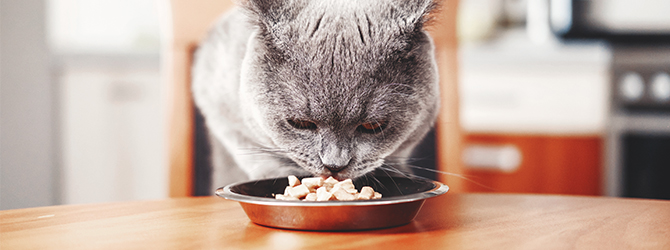Cat diet advice: what’s the best food to give my kitten or cat?
Just like us humans, your cat needs a balanced diet to help manage her weight and keep her fit and healthy. We look at some top tips to help you feed your cat a healthy diet.
Prices of cat food range dramatically, from premium brands to budget options. Like most things in life, you get what you pay for, and the more expensive brands often contain carefully balanced vitamins and minerals, as well as benefiting from the science and research that go into the development of their premium cat food.
Cat food that suits your pet… and your budget
Cheaper cat food can be made from inexpensive ingredients that are harder for your cat to digest, and have less nutritional value. If you need any more persuading, cheap foods with poor nutritional value will result in more poo out the other end as less of the ingredients are being used by the cat! This will also mean you have to feed a lot more of a cheap food to achieve what a smaller amount of good food will.
Of course, while you want to give your feline friend the best in life, ultimately, the food you buy will depend on your budget.
"Choosing a cat food that has meat, fish or egg either first or second in the ingredients list means it’s likely to be a good source of protein.”
Wet cat food vs dry cat food
Every cat responds to food in his or her own way, so it’s impossible to recommend one type of food that’s best for your cat. Dry cat food – also called cat biscuits – is popular and has the benefit of providing some abrasion to keep their teeth a little cleaner. Canned foods can also be a good choice but bear in mind wet foods can be up to 75% water and so this part is providing no nutritional value. Some cats enjoy a combination of wet and dry food, and you’ll probably need to try different brands and feeding schedules before settling on one that’s right for your cat.
Choosing the right cat food for your pet’s stage of life
As your cat matures, her dietary needs change. Kittens, with their immature digestive and immune systems, have different dietary needs to older cats.
Young cats typically need more calories to fuel their energetic lives, while older cats – who tend to sleep more and exercise less – may need less food, or a senior cat food that’s easier for them to digest without putting on weight.
The nutritional value of cat food
When you’re choosing a healthy cat food, always check the list of ingredients on the packet. It’s the law for pet food manufacturers to list their ingredients by weight, so choose a cat food that has meat, fish or egg either first or second on the list and you can be fairly sure you’re feeding your cat a protein-rich diet.
If you plan to make changes to your cat’s diet, always do this gradually to allow her digestive system to adapt.
How do I know I’m feeding my cat well?
If your cat is active and lively, has bright eyes, shiny fur, and is neither over nor underweight, it’s likely you’re feeding her a good diet.
If you have any concerns about her wellbeing – or if you suspect she has a health condition or a food intolerance – speak to your vet for advice on a diet to suit your cat’s needs.
Hydration, hydration, hydration
A constant supply of fresh water is vital to your cat’s health and wellbeing. Be sure to change her water daily, and keep her water bowl topped up throughout the day. You may want to consider a water fountain, which provides a fresh source of water all day long.
While we’re on the subject of hydration, it’s a common misconception that a saucer of milk is a treat for your cat. In reality, cats’ digestive systems can’t handle dairy products, and milk is likely to give your cat diarrhoea.
Need advice on choosing the right diet for your cat?
For help choosing the right food for your cat, speak to your local vet.
Find your nearest vet using our Find a Vet page, or speak to a vet online using Online Vets.

